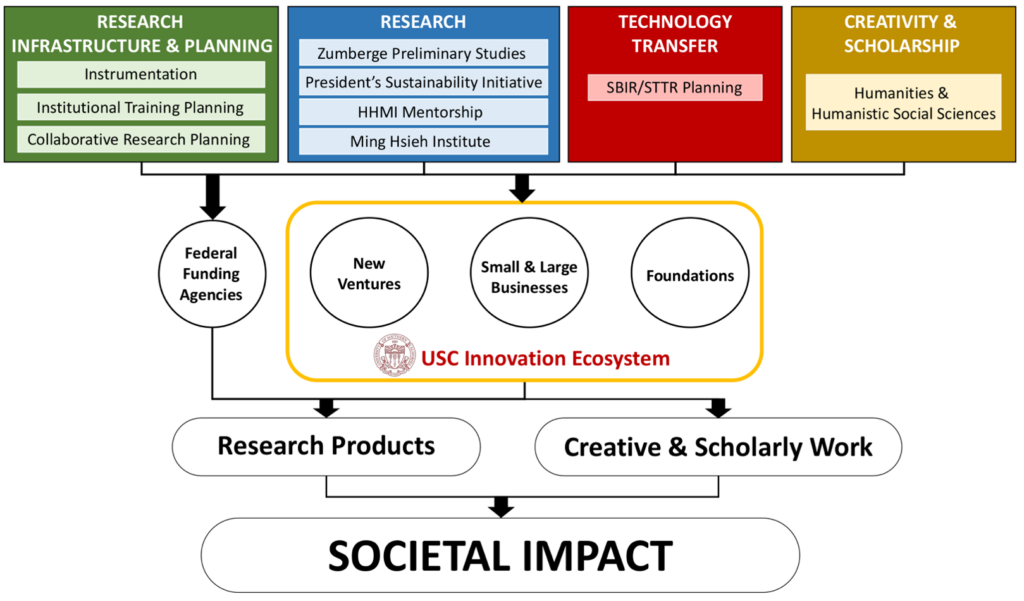Funding - Our Vision
Organization
Nine RII recurring research programs, corresponding budgets, and award figures are indicated in RII’s funding programs page. All awards are made contingent on both a scientific peer review and a programmatic review that will assure maximum efficiency for funding awards and strategic alignment with each program’s and the university’s strategic research priorities. Funds may be reallocated across subprograms within each solicitation. Programs are organized according to four domains:
1. Research Infrastructure & Planning: Support is provided for the purchase of shared instrumentation and also for planning grants to prepare for submission of instrumentation grants to external sponsors. This domain supports planning grants to prepare for the submission of institutional training grants to the National Institutes of Health and the National Science Foundation. RII collaborative research planning grants support research teams of USC faculty interested in applying for a collaborative effort at the federal level. These planning grants also will support strategizing efforts at a cross-institution scale, involving other research institutions.
2. Research: Support is provided for research activities that will generate preliminary data for inclusion in future large and small grant submissions to external sponsors. These grants also will support collaborative research at a cross-institution scale, involving other research institutions. Research activities specifically focused on sustainability, cancer research, STEM topics, diversity, equity, and inclusion in research, and mentorship at Howard Hughes Medical Institute laboratories also are supported.
3. Technology Transfer: Support is provided for planning activities or direct research activities that will facilitate submission of SBIR and STTR proposals to multiple federal funding agencies.
4. Creativity & Scholarship: Support is provided to promote scholarship across the humanities and humanistic social sciences. Support is also provided by a large-scale initiative that can include multiple USC faculty working together on a university-wide creative and scholarly activity.
Strategic Alignment
The short-term goals of the programs is to provide internal funding that allows researchers to:
a. Purchase equipment;
b. Plan and prepare for the submission of instrumentation, training, or collaborative research projects;
c. Conduct research to be used as preliminary studies for future grant submissions; and
d. Develop collaborations with small businesses to facilitate technology transfer and commercialization of research products.
In turn, the support provided by RII research programs will assist faculty in submitting competitive grant proposal applications to external sponsors. Most importantly, RII support will also facilitate partnerships and the obtainment of funding for research from venture capital firms, accelerators, incubators, small and large businesses, and foundations that are part of USC’s innovation ecosystem.
Funding provided by federal agencies and partners in USC’s innovation ecosystem will contribute to the long-term goal of developing the next generation of research products that will produce the greatest societal impact. The ninth RII program will support humanistic pursuits and is expected to stimulate creative and scholarly initiatives that contributes to the rich tapestry of the intellectual life of USC, to facilitate deeper intercultural understanding, and to lay the foundation for a civically engaged life in which we think critically, act creatively, and succeed in a rapidly changing world. A University-wide humanities initiative may be supported by external sponsors and also partners in USC’s innovation ecosystem, thereby enabling a long-term goal of sustaining creative and scholarly work that will produce the greatest societal impact.
RII's Vision for the Strategic Integration and Alignment of All Nine Programs Across Four Domains

